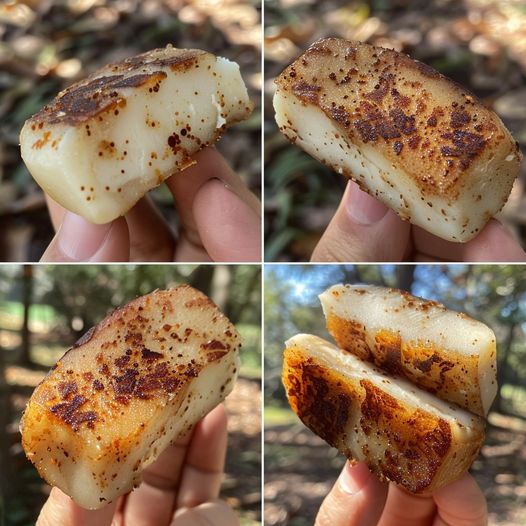ADVERTISEMENT
Vegan Halloumi Cheese

Spoon the thickened mixture into a 10-inch loaf pan or any mold of your choice. Smooth the top with a spatula.
Freeze the mixture for about one hour or refrigerate it overnight to allow it to set properly.
Preparing the Halloumi:
Once the mixture has solidified, carefully release the edges and transfer the cashew halloumi to a cutting board.
Warm a nonstick pan over medium heat and add a small amount of oil.
Slice the halloumi into desired shapes and cook each piece for about 2-3 minutes on each side until golden brown.
Applying the Glaze:
While the halloumi is cooking, prepare the glaze by mixing olive oil, lemon juice, thyme, and maple syrup in a small bowl.
During the last minute of cooking, brush the glaze over the halloumi pieces in the pan. This will give the cheese a beautiful, flavorful coating.
Serving:
Serve the vegan halloumi warm, garnished with fresh herbs and a sprinkle of rough sea salt to taste.
This cheese is delicious on salads, toast with avocados, or as a standalone snack.
Tips:
Blending: Ensure the cashew mixture is blended to a very smooth consistency for the best texture. A high-speed blender works best for this purpose.
Cooking: Be careful not to overcook the cashew mixture in the skillet, as it can become too thick and difficult to spread.
Freezing: Freezing helps to set the cheese quickly. If you choose to refrigerate overnight, ensure it is well covered to prevent it from drying out.
Glaze Application: Apply the glaze towards the end of cooking to avoid burning the maple syrup.
Nutritional Information (Per Serving):
Calories: 205 kcal
Carbohydrates: 16.7 g
Protein: 6.8 g
Fat: 12 g
Sugar: 3.9 g
Fiber: 1.5 g
Sodium: 150 mg
Additional Notes:
Variations: Feel free to experiment with different herbs and spices in the glaze. For a spicy kick, add a pinch of red pepper flakes or cayenne pepper.
Storage: Store any leftover halloumi in an airtight container in the refrigerator for up to a week. Reheat in a nonstick pan before serving.
Nutritional Yeast: This ingredient is essential for adding a cheesy flavor to the vegan halloumi. It’s available in most health food stores and online.
Agar Powder: Agar powder is a natural gelling agent derived from seaweed. It’s used in this recipe to help set the cheese. You can find it in the baking or health food section of most grocery stores.
Nutritional Information Breakdown:
Calories: This vegan halloumi is relatively low in calories, making it a great option for those watching their intake. At 205 kcal per serving, it provides a satisfying yet light addition to your meals.
Carbohydrates: With 16.7 g of carbohydrates, this cheese is a good source of energy. The natural sugars in the cashews and the glaze contribute to this amount.
Protein: Each serving contains 6.8 g of protein, making it a decent source of plant-based protein. This is especially important for those following a vegan diet.
Fat: The 12 g of fat in each serving is primarily healthy fats from the cashews and olive oil. These fats are essential for maintaining good health and providing energy.
Sugar: The sugar content is relatively low at 3.9 g per serving. Most of this comes from the maple syrup in the glaze.
Fiber: With 1.5 g of fiber per serving, this cheese can help you meet your daily fiber needs. Fiber is important for digestive health and maintaining stable blood sugar levels.
Sodium: At 150 mg of sodium per serving, this vegan halloumi is lower in salt compared to traditional cheeses. This makes it a healthier option for those monitoring their sodium intake.
Conclusion:
This Vegan Halloumi Cheese recipe is a fantastic addition to any vegan diet. It’s easy to make, uses simple ingredients, and has a wonderful flavor and texture. Whether you’re serving it on a salad, toast, or as a snack, it’s sure to be a hit. The combination of the creamy cashew base and the tangy, sweet glaze creates a delightful taste experience that’s both nutritious and delicious. Enjoy making and eating this wonderful vegan cheese!
ADVERTISEMENT